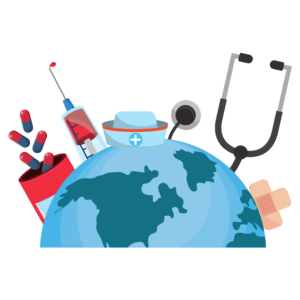Pharmaceutical physicians, fragile health care systems and the humanitarian provision of medicines
Posted on: Tuesday 28 May 2024
Author: Dr Bu Siakpere FFPM

As pharmaceutical physicians we may play many roles in maintaining and improving human health, but one area where I feel that our unique skills and knowledge can be deployed more extensively is within communities suffering from humanitarian crises.
Despite great progress in many aspects of healthcare, for millions of people worldwide, access to effective medicines and healthcare remains limited for reasons ranging from poor healthcare infrastructure, geographical inaccessibility and economic hardship, to cultural constraints, natural disasters and conflict.
Humanitarian activities include the provision of water, food, medicines and healthcare, education, fuel, and security. The United Nations has 17 sustainable development goals (SDGs); and within this framework are targets seeking to improve what is lacking for many people. SDG number three is Good Health and Wellbeing [1].
During acute or chronic crises, it can potentially be difficult to understand where and how we can contribute to alleviate suffering due to an array of often competing needs. While the default position amongst individuals might be to do nothing (due to the enormity of the situation), pharmaceutical physicians can make a positive impact in many ways to these seemingly overwhelming situations.
Day to day I hear of needless morbidity and loss of life often due to the most seemingly avoidable causes, ranging from malfunctioning equipment, lack of basic healthcare resources, human error and wider societal issues such as poor education, misinformation, malnutrition, lack of sanitation, climate challenges, conflict and the list goes on…..The media highlights new crises often profoundly affecting thousands or millions of people across all continents, but there are also on-going longstanding challenges particularly in the global south, where long term humanitarian interventions are required to tackle health needs ranging from childhood pneumonia and malnutrition, to maternal mortality, non-communicable and many infectious diseases.
“Day to day I hear of needless morbidity and loss of life often due to the most seemingly avoidable causes.”
As pharmaceutical physicians working with other professionals in the development and use of medicines, we have a key role to play in ensuring the right medicines are provided to those in very difficult situations. This is particularly applicable where healthcare systems are inherently fragile or suddenly disrupted. In these instances, local or international non-governmental organisations play a key role in facilitating the distribution of aid, including medicines and vaccines. We can contribute by working to adapt existing medicine offerings to address population needs, such as the provision and governance of essential medicines, emergency medicines, supply chains, and vaccination programmes. Addressing the common medical needs of displaced populations such as infectious diseases, maternal-child and mental health conditions, requires effective evaluation of current health provisions identified by organisations closely connected to or able to access those most impacted. It is not necessarily easy to accomplish these tasks, and despite the best intentions, results may be slow to materialise, met with scepticism or straight forward rejection. Nonetheless, I encourage everyone to try to take action, whether as individuals, part of a team, through academic affiliations, self-employment or employment to contribute to an eco-system that effectively links multiple areas ranging from health, nutrition, education, security and the other areas needed to allow us all to enjoy our lives [2] [3].

I have first-hand experience and have witnessed the efforts of many organisations and individuals striving to make a positive difference in the face of seemingly insurmountable challenges, where the actions or voices of individuals might appear insufficient to make an impact. As a medical student I spent my elective in Sudan, in poorly-resourced government hospitals in obstetrics, gynaecology and general medicine departments. I also observed the work of non-governmental international organisations working on the border with Ethiopia. As a clinician, I worked as a medical officer in a hospital in rural South Africa and later, in my pharmaceutical professional journey, I undertook a secondment supported by GSK to serve as a Global Pneumonia Advisor for Save The Children. Needless to say, I learnt a lot about what it takes to deliver healthcare in challenging environments. Sadly, some of the areas I worked in were in dire need of stability, security, economic development and significant improvements in healthcare provisions and they are still in difficulties today.
Examples of how pharmaceutical industry support can be made includes grants, bursaries, skills exchanges or secondments, donations of medicines or other medical supplies, research and development into areas often under-served including: women’s health, paediatrics, infectious diseases. We can also provide pro-bono support to organisations directly or collaboratively on a macro or local level – supra-national or regional groups or specific health care facilities subject to local laws and regulations. I believe we can highlight the work we do, and could do, to foster even greater collaboration with other stakeholders to improve the healthcare offerings in challenging situations.
Lack of access to medicines is an inequality. FPM established an Equality, Diversity and Inclusion (EDI) Forum in 2021, and I am amongst the founding members of this team who are striving to improve the experience of our members and beyond in this area. Many other health focused organisations ranging from healthcare providers, charities, academic and professional bodies to regulators and bio / pharmaceutical companies, have acknowledged the need to address the many aspects of inequities in healthcare. FPM’s Global Forum brings together pharmaceutical physicians across the world to advance the pharmaceutical medicine community. Collectively as professionals who are responsible for millions of doses of medicines, we can collaborate through our organisations and as individuals with partners to make a valuable contribution towards addressing inequalities. This includes providing or enabling access to effective, high-quality medicines and improving millions of lives.
Background links
- United Nations, U. (n.d.). Deliver Humanitarian Aid. [online]. Available at: https://sdgs.un.org/goals/goal3.
- WHO. (n.d.). WHO Model Lists of Essential Medicines. [online] Available at: https://www.who.int/groups/expert-committee-on-selection-and-use-of-essential-medicines/essential-medicines-lists.
- WHO. (n.d.). eEML – Electronic Essential Medicines List. [online] Available at: https://list.essentialmeds.org/?section=&indication=&year=&age=&sex=female
- Devex. (2016). Pharmaceutical companies donating medicines in crisis situations. [online] Available at: https://www.devex.com/news/pharmaceutical-companies-donating-medicines-in-crisis-situations-87797.
- RCOG. (n.d.). RCOG response to the humanitarian crisis in Gaza and Israel. [online] Available at: https://www.rcog.org.uk/news/rcog-response-to-the-humanitarian-crisis-in-gaza-and-israel/
- ICRC (2013). International Committee of the Red Cross. [online] Available at: https://www.icrc.org/.
- British Red Cross. (n.d.). What is happening in the Occupied Palestinian Territories and Israel? [online] Available at: https://www.redcross.org.uk/stories/disasters-and-emergencies/world/occupied-palestinian-territories-and-israel-crisis-appeal.
- GOV.UK. (n.d.). UK humanitarian framework. [online] Available at: https://www.gov.uk/government/publications/uk-humanitarian-framework/uk-humanitarian-framework.
- ABPI. (n.d.). Ukraine- UK Pharmaceutical Industry Response | UK Pharmaceutical Industry Response. [online] Available at: https://www.abpi.org.uk/ukraine/.
- DEC. (n.d.). Who we are | Disasters Emergency Committee. [online] Available at: https://www.dec.org.uk/who-we-are.
- Save the Children. (n.d.). Pneumonia | Save the Children UK. [online] Available at: https://www.savethechildren.org.uk/what-we-do/health/pneumonia.
- Rescue. (n.d.). International Rescue Committee | International Rescue Committee (IRC). [online] Available at: https://www.rescue.org/uk.
- Kznhealth.gov.za. (2024). Brief History of Mosvold Hospita. [online] Available at: https://www.kznhealth.gov.za/Mosvold/history.htm
- UKRI. (n.d.). What we do. [online] Available at: https://www.ukri.org/what-we-do/.
- UK-Med. (n.d.). About Us. [online] Available at: https://www.uk-med.org/about-us/

Hungry for more?
Our upcoming FPM Annual Symposium 2024 will explore issues of equality and diversity in our stream titled 'A fairer world'
